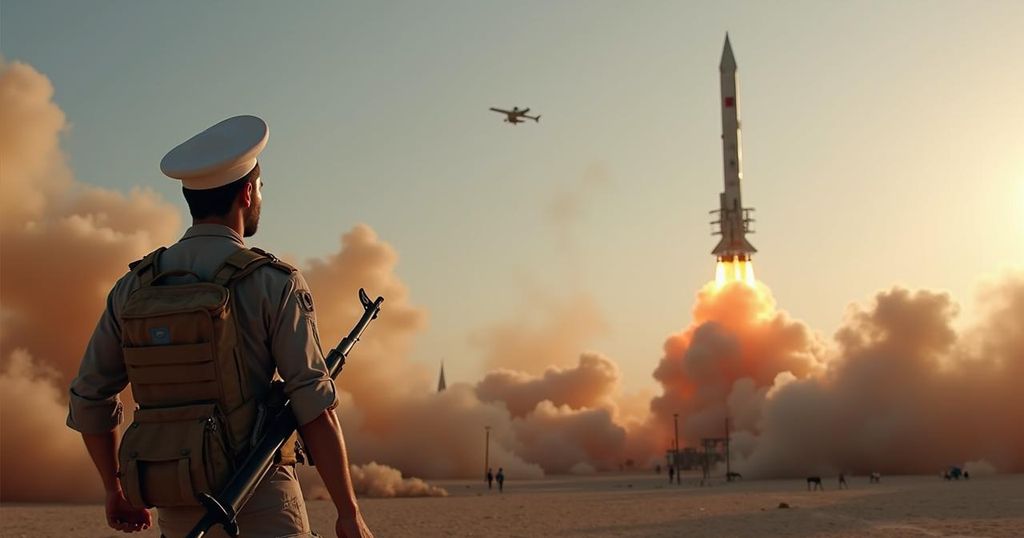Iran’s Nerves Heighten Amid Israel’s Possible Retaliation for Missile Strikes
Iran is increasingly anxious about Israel’s possible response to its missile attacks, engaging in urgent diplomatic efforts to mitigate backlash. U.S. officials urge Israeli restraint, warning of wider conflict. Iran’s ally Hezbollah has been weakened by Israeli actions, complicating Tehran’s stance. Gulf allies express concern over potential attacks on Iranian oil facilities, and the situation remains tense as diplomatic communications attempt to navigate the crisis. The U.S. does not believe Iran seeks full-scale war, but uncertainties persist regarding its response.
The Iranian government is reportedly on edge due to the potential repercussions of its recent missile attacks and is actively seeking diplomatic channels with neighboring countries in an attempt to mitigate Israel’s expected military response. Sources indicate a heightened level of anxiety as Iran reflects on the uncertain ability of the United States to dissuade Israel from targeting its nuclear installations and oil infrastructure. Furthermore, Iran’s primary regional ally, Hezbollah, has faced significant setbacks from recent Israeli military actions, exacerbating Tehran’s concerns. The United States has engaged in discussions with Israel regarding the aftermath of Iran’s missile strikes on October 1. American officials have made it clear that the United States opposes any Israeli action against Iranian nuclear sites or oil facilities. During a recent conversation between U.S. President Joe Biden and Israeli Prime Minister Benjamin Netanyahu—the first in nearly two months—Biden emphasized that Israel’s response must remain “proportional.” Concerns have also been voiced by Gulf nations, such as the United Arab Emirates, Bahrain, and Qatar, regarding the potential fallout from attacks on Iranian oil facilities, which could have far-reaching economic and environmental consequences for the region. The Biden administration is particularly apprehensive that the ongoing hostilities could escalate into a larger regional conflict involving U.S. interests. The historical context reveals a diminishing influence of the United States over Israeli military decisions, with Israel having acted unilaterally in recent months without Soviet consultation, including a substantial operational assault aimed at Hezbollah. An Israeli official noted that the security cabinet has not yet reached a definitive conclusion on its course of action, with suspicions regarding the transparency of the cabinet’s discussions with Washington. Despite Israel having long been prepared for potential strikes against Iranian nuclear facilities, including simulating such operations in military exercises, there has been no firm commitment from Israel on refraining from targeting these sites. Defense Minister Yoav Gallant warned Iran that any response from Israel will be “powerful, precise, and above all—surprising.” While neighboring Gulf states prefer to remain neutral in the escalating tension, there have been assurances made that they will deny Israel access to their airspace for any operations aimed at Iran. Jordan has likewise stated its intention to protect its airspace from unauthorized intrusions, irrespective of their origin. Although the U.S. perceives that Iran does not desire full-scale conflict with Israel, there remains uncertainty about Iran’s potential responses to any Israeli military actions. The Iranian Foreign Minister has accused Netanyahu of instigating conflict purely for political gain, while reports indicate that diplomatic engagement with Saudi Arabia has increased amid these tensions in an effort to garner regional support against potential Israeli action. As the situation unfolds, Israel approaches a period of cultural observance with Yom Kippur, which could affect operational planning. Amidst this backdrop, all parties involved remain watchful of developments as they navigate these heightened tensions.
The geopolitical landscape surrounding Iran and Israel has remained tumultuous, particularly following Iran’s missile attacks earlier in October. The complexity of U.S.-Israel-Iran relations, along with the involvement of proxy groups like Hezbollah, significantly impacts the stability within the Middle East. The United States has historically sought to regulate and mitigate conflict involving Israel, yet recent military actions, coupled with U.S. diplomatic efforts, have tested this longstanding balance. The rising tensions and military posturing highlight the precarious nature of regional politics, where miscalculations could lead to widespread conflict.
In summary, the Iranian government is under significant pressure as it assesses the ramifications of its recent actions against Israel, amid fears of a consequential Israeli military response. The ongoing communications between the United States and Israel indicate a desire for restraint, yet the evolving dynamics among regional allies complicate diplomatic efforts. With both sides preparing for potential escalations, and Israel’s military capabilities remaining a critical factor, the possibility of conflict looms, posing challenges to regional stability and U.S. interests. As all eyes remain on the actions of Israel and Iran, the impact of these developments will undoubtedly reverberate throughout the Middle East.
Original Source: www.cnn.com




Post Comment